Hidden footage obtained by the Mail & Guardian has revealed that the voters’ registration process ahead of Zimbabwe’s election has not been as free and fair as people hoped.
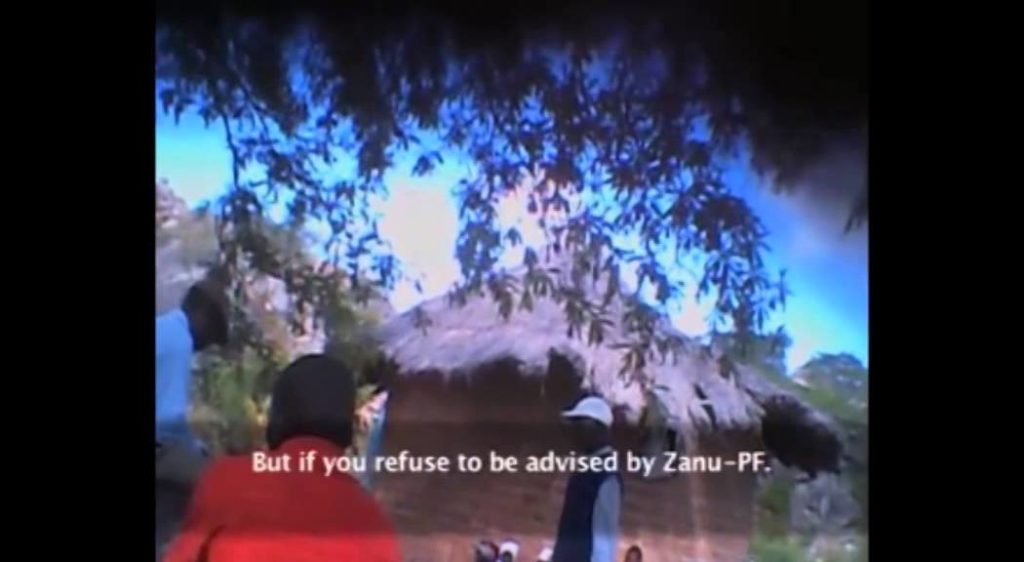

Hidden footage obtained by the Mail & Guardian has revealed that the voters’ registration process ahead of Zimbabwe’s election has not been as free and fair as people hoped.
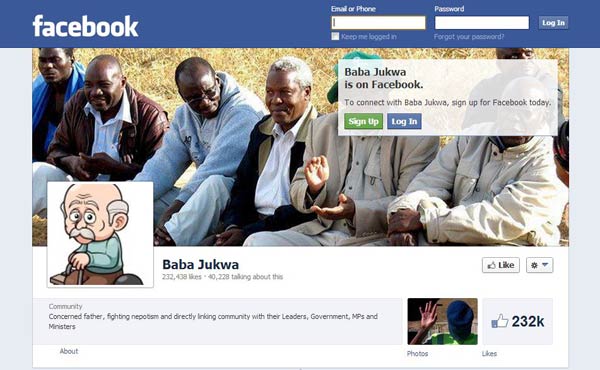
His name is whispered in buses, bars and on street corners by Zimbabweans eager for the inside scoop on President Robert Mugabe’s ruling party. One avid follower even climbs a tree in a rural village for a signal to call a friend for the latest tidbits from the mysterious yet stupendously popular character.
Baba Jukwa, or Jukwa’s father in the local Shona language, is a Zanu-PF party “mole” who says on his popular Facebook page that he is disheartened by the “corrupt and evil machinations” of Mugabe’s fractious party.
Since its launch in March, the Baba Jukwa page has at least 230 000 Likes – more than Mugabe’s and Prime Minister Morgan Tsvangirai’s.

The page reveals what it claims are exposés by well-connected insiders of Mugabe’s health secrets, murder, assassination and corruption plots, and intended intimidation and vote-rigging ahead of upcoming elections scheduled for the end of July.
Zimbabweans who are fans of Baba Jukwa’s page now say they have unfettered access to what they have always wanted to know but never dared ask for fear of being arrested. Under the nation’s sweeping security laws, it is an offence to undermine the authority of the president and national security operatives.
Baba Jukwa claims on the page that there is a bounty on his head, although it is believed there are several authors behind his name because the writing style of the posts changes from day to day.
Inside info
After state-run media loyal to 89-year-old Mugabe said the president made a trip to Singapore for an eye check-up, the Baba Jukwa page stated: “When we welcomed him at the airport yesterday early in the morning our old man, ladies and gentlemen, looked weaned and very weak. It was clear that the chemotherapy process he went through in Far East Asia was still having effect on him.”
The page also said Mugabe was suffering from a severe recurrence of prostate cancer.
With the catchphrase “tapanduka zvamuchose,” a Shona term meaning he has “gone rogue”, Baba Jukwa gives details of secret venues and times of undercover meetings.
Zanu-PF insiders have reported they are afraid to leave important meetings to go to the bathroom in case they are suspected of firing off smart phone texts to Baba Jukwa. The page has reported getting tip-offs from the midst of meetings of Mugabe’s politburo, its highest policy making body, and other confidential gatherings.
Zimbabwe has an estimated 12-million mobile subscribers with 60% estimated to have direct access to the internet through their cellphones, according to commercial company reports from the three main mobile networks.
McDonald Lewanika, director of Crisis Coalition, an alliance of democracy and human rights groups said the Facebook page has provided ordinary Zimbabweans with a platform to access information on secretive state security operations. Lewanika said Baba Jukwa remains anonymous because of the dangers associated with what he is doing.
“It is a bad sign for the country that there’s no free flow of information,” Lewanika told The Associated Press.
The faceless Baba Jukwa vows to end Mugabe’s rule by exposing the alleged involvement of his top officials, secret agents, police and military in the violence that led to disputed elections in 2008 and corruption and internal plotting ever since.
Baba Jukwa says Mugabe won’t be able to withstand a gruelling election campaign.
‘He fabricates lies’
Zanu-PF spokesperson Rugare Gumbo said that his party does not know the identity of Baba Jukwa and other possible contributors.
The posts are factually incorrect, he said. However, some have proven to be correct as events unfold. The distribution of private and secret telephone numbers of security agents and forecasts of political developments have been corroborated in later public statements by Mugabe’s Zanu-PF party.
“Whoever he is, he fabricates lies and is not doing any good to the morality of our society,” Gumbo said.
Baba Jukwa claims Mugabe’s Zanu-PF is incensed by the page, is making desperate efforts to establish his identity and has put a $300 000 bounty on him or other contributors being unmasked. That claim could not be verified.
“They are wasting their time as I am extremely careful and working from within the country and will never go anywhere as long as these evil old people exist I will continue fighting. My blood will water freedom and democracy for Zimbabweans if I die for this cause,” he posted recently.
“Asijiki“, a word in the local language for “we do not retreat”, is the sign-off Baba Jukwa uses at the end of all the posts.
Baba Jukwa has been dubbed “Zimbabwe’s own Julian Assange” by his followers, but he describes himself in the local Shona language as “mupupuri wezvokwadi” (the harbinger of truth).
Leaked information
A former minister from Mugabe’s party was killed in a car wreck on June 19 after a post from Baba Jukwa had warned of an assassination plot against him several times. The page claimed Edward Chindori-Chininga was suspected of being a Baba Jukwa contributor who leaked inside information on infighting in Mugabe’s party.
“I told you there will be body bags coming this year … The war has begun,” Baba Jukwa posted on his wall.
His posts have detailed the correct private phone numbers of police, intelligence chiefs and under-cover intelligence officers and urged readers to call them.
Saviour Kasukuwere, the nation’s black empowerment minister, publicly admitted to receiving least 50 insulting calls a day. Some even went to his children and aging mother.
He said the calls were taking a toll on his family but added: “It’s a price we have to pay for our country”.
Baba Jukwa has promised to revealed his identity in time.
“I assure you will know me in a new Zimbabwe where our government will be transparent,” he said. – Sapa-AP
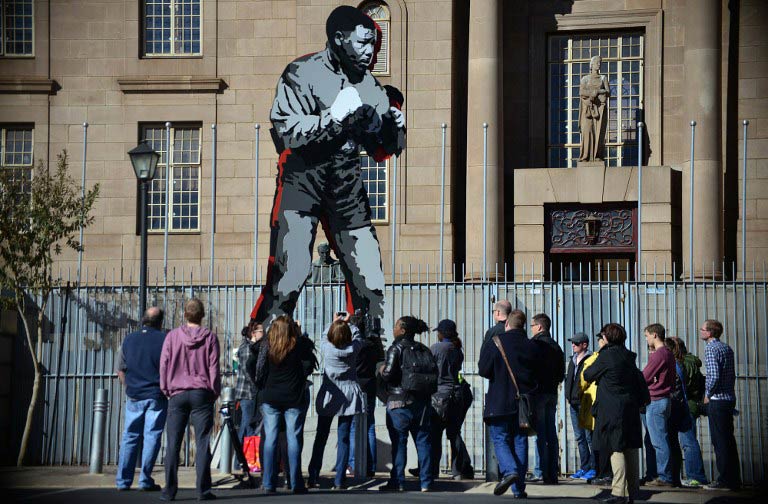
In a sweaty township gym where Nelson Mandela once trained as a young boxer, athletes are still pumping iron today, inspired by the peace icon’s example as he fights for his life in hospital.
In the early 1950s, a youthful Mandela worked out on week nights at the Donaldson Orlando Community Centre, or the “D.O.” as it’s still affectionately known.
Spartan and slightly run down, the walls ooze with the intermingled history of sport, community life and the decades-long fight against apartheid oppression.
It was here that Mandela came to lose himself in sport to take his mind off liberation politics.

Nestled in the heart of South Africa’s largest township just south of Johannesburg, the community centre was also where famous African songbirds like Miriam Makeba and Brenda Fassie first performed.
The 1976 uprising against the imposition of the Afrikaans language in black schools were planned from the D.O. as Mandela and other leaders languished in apartheid jails.
“Here, look, these are the very same weights Madiba used for training,” proud gym instructor Sinki Langa (49) says.
“They have lasted all these years,” he said as he added another set to a bar his fellow trainee Simon Mzizi (30) was using to furiously bench-press, sweat dripping down his face.
Nearby, other fitness enthusiasts worked out to the tune of soothing music which, unusually for a gym, included opera.

‘Drenched with sweet memories’
The D.O. – or Soweto YMCA as it is called today – opened its doors in 1948, the same year the apartheid white nationalist government came to power.
Built with funds donated by Colonel James Donaldson, a self-made entrepreneur and staunch supporter of the now governing African National Congress, the D.O. centre includes a hall, and several sparsely furnished smaller rooms like the one where Mandela sparred as a young man.
Today the gym is housed in an adjacent hall, which was the original building on the grounds erected in 1932.
Mandela joined the D.O. in around 1950, often taking his oldest 10-year-old son Thembi with him.
In a letter to his daughter Zinzi, while on Robben Island where he spent 18 of his 27 years in jail, Mandela recalled his days at the gym.
“The walls … of the DOCC are drenched with the sweet memories that will delight me for years,” he wrote in the letter, published in his 2010 book Conversations with Myself.
“When we trained in the early 50s the club included amateur and professional boxers as well as wrestlers,” Mandela wrote to his daughter, who never received the letter because it was snatched by his jailers.
Training at the D.O. was tough and included sparring, weight-lifting, road-running and push-ups.
“We used to train for four days, from Monday to Thursday and then break off,” Mandela told journalist Richard Stengel in the early 1990s, while writing his autobiography Long Walk to Freedom.
When he was handed a life sentence in 1964, Mandela kept up the harsh regime of his training to stay fit and healthy.
“I was very fit, and in prison, I felt very fit indeed. So I used to train in prison … just as I did outside,” Mandela said in a transcript of his conversation with Stengel, given to AFP by the Nelson Mandela Centre of Memory.
Mandela was eventually released from jail in 1990 and in 1994 he was elected South Africa’s first black president.
‘He’s a fighter’
In Long Walk to Freedom, Mandela admitted he was “never an outstanding boxer”.
“I did not enjoy the violence of boxing as much as the science of it… It was a way of losing myself in something that was not the struggle,” Mandela wrote.
“Back in those days, boxing was very popular – it was part of that culture,” Shakes Tshabalala (81) who has been involved with the centre from the start told AFP.
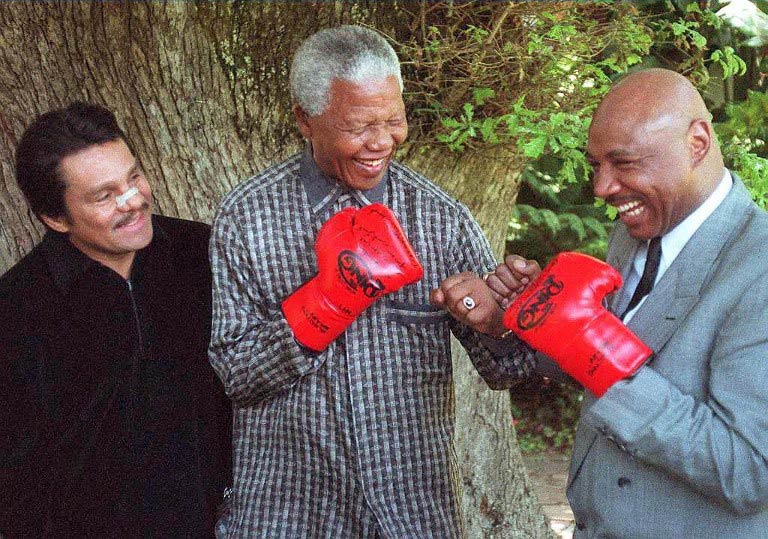
Pugilism always played a big part in Mandela’s life. At his house-turned-museum at 8115 Orlando West, boxing-related items like the WBC World Championship belt donated by Sugar Ray Leonard are on display.
Back at the centre, a new generation of youngsters are training.
Although few of them box today, they draw their inspiration from Mandela’s example in healthy living.
While the ailing 94-year-old statesman is battling a recurring lung infection, the gym-goers firmly believe the liberation icon will return for one last round.
“Mandela was a sportsman. This is why today he is still alive,” said gym instructor Langa.
“I am worried about him, but I know he’ll win. He’s a fighter,” he said.
Jan Hennop for AFP
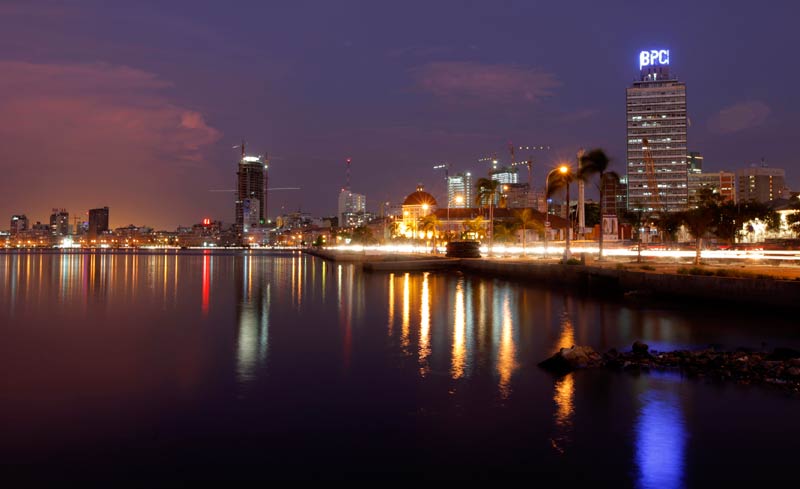
Luanda: a city where everyone seems to have money, kids drive better cars than some senior execs in New York do and attending a mundane New Year’s Eve party costs at least $100. For the past few years now, the Angolan capital I call home has had the dubious distinction of being ranked as one of the most expensive, if not the most expensive, city in the world for expats. The latest reports by Mercer and ECA International rank Luanda second on the list.
Many an article about exorbitant prices has been written by a foreign correspondent while sipping on a $10 latte in one of the city’s $482-a-night hotel rooms. At the notoriously pricey Casa dos Frescos, a supermarket that caters to expats, a melon can cost almost $100 (Luandans jokingly call it melão de ouro or the golden melon), while a rather small burger at the Epic Sana hotel will set you back a cool $25.
Excessive, right? Especially so in a city where an estimated two-thirds of the population live on less than $2 a day. As Lula Ahrens explains in this excellent post, there are two main reasons behind these exorbitant prices: a crippling civil war and general corruption. After three decades of sustained civil war that lasted until 2002, the country’s infrastructure was decimated and important industries such as agriculture and manufacturing never had a chance to develop in an independent Angola. As a result, almost everything has to be imported. Corruption and an entrenched bureaucracy further drive up the price of goods, as does the high demand for limited supply of housing, foodstuffs, and luxury items. Luanda is a booming oil town that attracts expats; they, in turn, demand certain products and services that are in short supply in the country.
If you’re visiting Luanda and want a good time, you’ll need cash – lots of it, preferably in US dollars. Conventional wisdom will tell you that when visiting a foreign city it’s always better to go out with a local, and this could not be truer in Angola. Locals will help you navigate the fluid Luandan nightlife scene and keep the notoriously unfriendly bouncers at bay. The savvy ones will also show you how to party without breaking the bank.
Visitors will quickly realise that there are two Luandas: the formal, established Luanda frequented by expats and the local elites, and the vast, informal, sprawling Luanda of musseques (slums) where the majority of residents live. This divide will immediately become apparent when you notice the sheer number of unemployed street sellers snaking their way through traffic. The streets are Luanda’s true marketplace where many citizens buy their wares. They also shop at open air markets which sell everything from fresh meat to shoes to vacuum cleaners to mirrors.

As any great night always does, yours should begin with food. On my blog Luanda Nightlife you’ll find many restaurant reviews which are organised by price so you won’t be shocked when your bill arrives. Alternatively, you can always ask locals for restaurant options. The good ones will point you to places where all the foreigners hang out; the best ones will give you the option of eating with Angolans or foreigners. If they decide on the latter, your destination will most likely be the Ilha (Island) area, a peninsula jutting out towards the Atlantic Ocean with one side facing the Luanda Bay and the other facing the Atlantic.
The Ilha is the perfect microcosm of Luanda’s reality: opulence coexisting with abject poverty. For first-time visitors, this juxtaposition of wealth and poverty can be jarring. Porsche Cayennes and BMW X6s compete for space with the city’s ubiquitous candongueiros (taxi vans). You’ll find women in colourful traditional dress on the side streets grilling fish their husbands caught, while down the same street posh restaurants will be serving the same dish to patrons for much, more more.
It is on this strip that you will find some of Luanda’s best restaurants: Cais de Quatro, renowned for its international cuisine and fantastic views of the city from across the bay; Vais e Cais, a bay-side restaurant specialising in fresh seafood; and Luanda’s own Chimarrão, which borrows the rodízio concept from Brazil and turns into an open air club at night. A meal at any of these restaurants costs an average of $60; add about $30 if you plan on having drinks.
Further down the Ilha, past the mansions standing side-by-side with slums, past what was once the zoo, past ‘billionaire’ Isabel dos Santos‘s Miami Beach restaurant, you will find Chill Out, Coconuts and Lookal, which are all rated among the city’s best restaurants. At trendy, cosmopolitan Chill Out don’t expect to pay less than $100 for your full meal. Stay a bit longer and the place will turn into a house-heavy open-air ocean-side club full of expats and ladies of the night. Coconuts is more understated; it’s a favourite among locals and expats alike. Despite its beach-side location there is no party after dinner.
Lookal currently seems to be everyone’s favourite spot. It’s a bar, lounge, restaurant, club and beach all rolled into one; the seafood is fantastic, the beer is cold and the music is loud. Your wallet will be about $70 lighter after a meal here. At night, all the girls and their cash-wielding boyfriends come out and several DJs compete for influence over its vast dance floor. There are regular live shows as well. Last year Taboo from Black Eyed Peas made an appearance; a couple of years before that house DJ Erick Morillo played to a sold-out venue.
If your Angolan guide chooses a restaurant favoured by locals – as a true guide should – you’re in luck and so is your wallet. You see, Angolans are inherently extroverted people who love a good meal and a good party; we’ve been enjoying fantastic food in reasonably priced restaurants well before Luanda made it onto Mercer’s ratings. Among the more down-to-earth restaurants in Luanda is La Vigia, a type of Angolan open-air ‘bistro’ that’s frequented by locals and visitors alike. It’s famous for its massive grilled grouper or any other fish really. A meal here costs about $35.
If you end up on the Ilha anyway, Casa do Peixa da Bela has what many have called the best mufete in town. This traditional Angolan dish consists of grilled fish accompanied by beans stewed in a palm oil sauce, boiled plantains and a delicious onion and parsley vinaigrette to baste your fish with. In nearby Quintal do Tio Jorge, you can enjoy traditional Angolan cuisine while listening to live Cape Verdean music. It’s in a backyard, it’s not the cleanest, you will probably encounter the local drunkard, but a cold Cuca (the local beer) costs $1.50, the delicious fried squid starter is $10 and a heaped plate of fish with potatoes, palm oil beans and banana won’t cost you more than $15-$20.
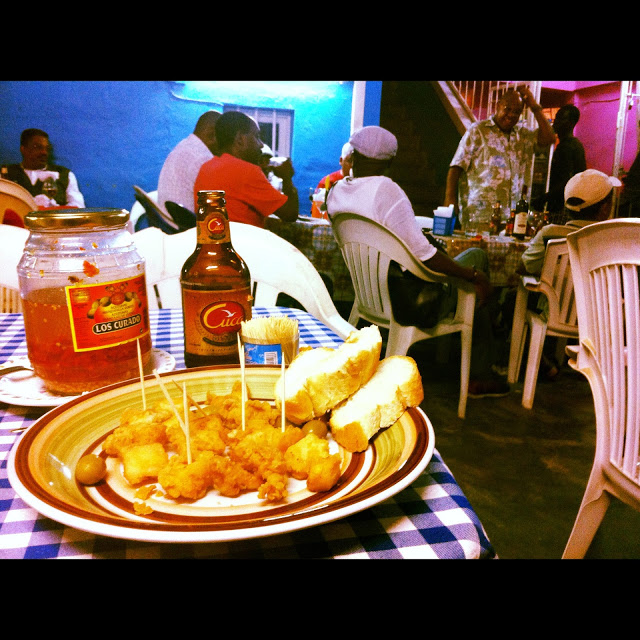
To get your dance on, head to Maiombe instead of Lookal. It’s a genuine Luandan club with booming kizomba, zouk, kuduro and Congolese music. $20 will get you entry and several drinks. W Klub and Brasília are two other local favourites where you can have a decidedly local experience for very reasonable prices. But the best, of course, is to get invited to a proper Angolan party in a resident’s backyard. Those are free and invariably more fun.
Claudio Silva is an Angolan living in New York City. He has also spent time in Washington DC, Lisbon, Reading (UK) and attended university in Boston. In 2009, he started Caipirinha Lounge, a music blog dedicated to Lusophone music. Claudio contributes to several other blogs including Africa is a Country and Central Angola 7311. Connect with him on Twitter.
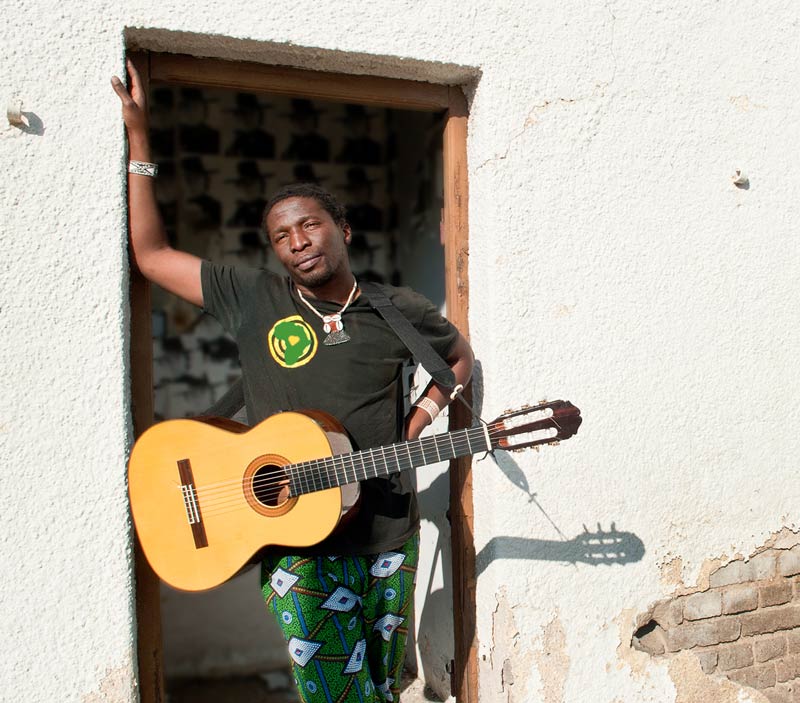
Namibian artist Elemotho G.R Mosimane is the first musician from his home country to win the 2012 RFI-France 24 Discoveries Awards, among a list of more than 500 African, Indian and Pacific artists.
As part of the singer and songwriter’s prize, he received a promotional tour around Africa to 25 countries and an exclusive concert in Paris. Later this year he’ll be touring India, Malaysia and Nepal in a bid to raise his music profile.
The artist, who grew up in the Kalahari, plays acoustic guitar and blends the sounds and rhythms of his home country with folk influences. He sings in his mother tongue Setswana, English and other Namibian languages.

The RFI-France 24 Discoveries Awards is a contest open to singers in Africa and the Indian Ocean islands since 1981. The awards have helped launch the international careers of many artists, among them Ivorian reggae singer Tiken Jah Fakoly, Malian music duo Amadou & Mariam and artist Rokia Traoré, also from Mali.
Since scooping the award in October last year, Elemotho signed a worldwide distribution deal with UK-based record label ARC Music and has just released his third album, Ke Nako (It’s time).
He doesn’t classify his music under a specific style. “I see myself as a performing artist and musical activist; I like to throw reality around, thus exploring the depth of the human spirit.”
From rural boy to modern lyricist, Elemotho stands out from the usual commercial and easily consumable sounds by using experimental ideas and delivering his own vision of music.
Rhodé Marshall caught up with him for an interview ahead of his South African tour this week.
How did your love affair with music begin?
I have always had music and storytelling around me growing up as a farm boy around the fire with my grandmother. It was not until University while studying African philosophy and psychology that the music bug bit me.
You compose, record and play your own music. That’s quite a feat.
For me, music is a spiritual thing. Sometimes the songs come to you, sometimes you have to look for them. Recording music is like a pregnancy. I don’t do too many records, because it takes time to live the stories, and even more time to tell them. The acoustic guitar just does it for me. I cannot truly explain the many hats I wear, I guess in the end every artist is after something.
Describe your music.
I do not like to describe the music I do, but if I have to I would say it’s Afro-fusion. The new sound of the Kalahari, melodies of meditation with messages for our modern times.
What are your thoughts on the Namibian music industry?
Namibia has a small population and an emerging arts scene. There is much potential for us. Many people do not know Namibia, let alone the music. But I believe it’s bound to change.
What genre of music is currently trending in Namibia?
There is an emerging Namibian folk trend with a number of female singers/guitarists, something to look forward to.
Which other Namibian artists should we be looking out for?
There are a number of them – Ras Sheehama, Erna Chimu, Ngatu and Big Ben to mention a few. I recommend a CD called A handful of Namibians that’s a compilation of different Namibian musicians and genres.
What is different about your latest album compared to your previous two?
With Ke Nako it’s the first time I worked with a producer, Christian Polloni. He brought out the best in me. It’s a very timely album, and I feel that being a father and a family man does a lot for me in terms of perspective and approach.
You’ve been touring Africa for the past three months. What are the most interesting things you’ve encountered in the countries you’ve visited?
First and foremost I would like to say that Africa is a very diverse continent. Each country and region is producing an amazing patchwork of music, foods, history and more. Dakar, Senegal is quite something – an amazing city that rarely sleeps, a constant flow of culture, local and international. I found St. Louis to be magical – the river and sea, the new and old town, Wolof, Arab and French-fused fashions. Cotonou, the capital of Benin, is a port side city with thousands of motorbike taxis and amazing people. It’s the land of Angelique Kidjo and the land of voodoo!
What’s next for you?
Only the sky is the limit.
How can fans interact with you?
I’m on Facebook and my website is www.elemotho.com
South Africans can see Elemotho live this week:
Johannesburg
June 6 2013, 5:30pm
The Grove esplanade
Braamfontein
Pretoria
June 9 2013, 2pm
Alliance Francaise
Rhodé Marshall is the Mail & Guardian Online’s project manager and unofficial entertainment reporter. She started as a radio reporter and producer in Cape Town, before jumping into online news. With one hand glued to her phone and the other to a can of Coca-Cola, she is a pop culture junkie. Connect with her on Twitter.